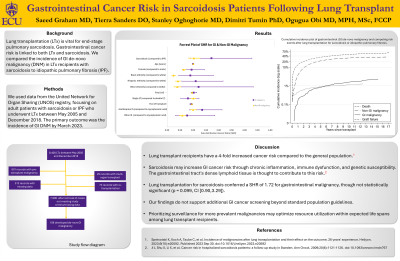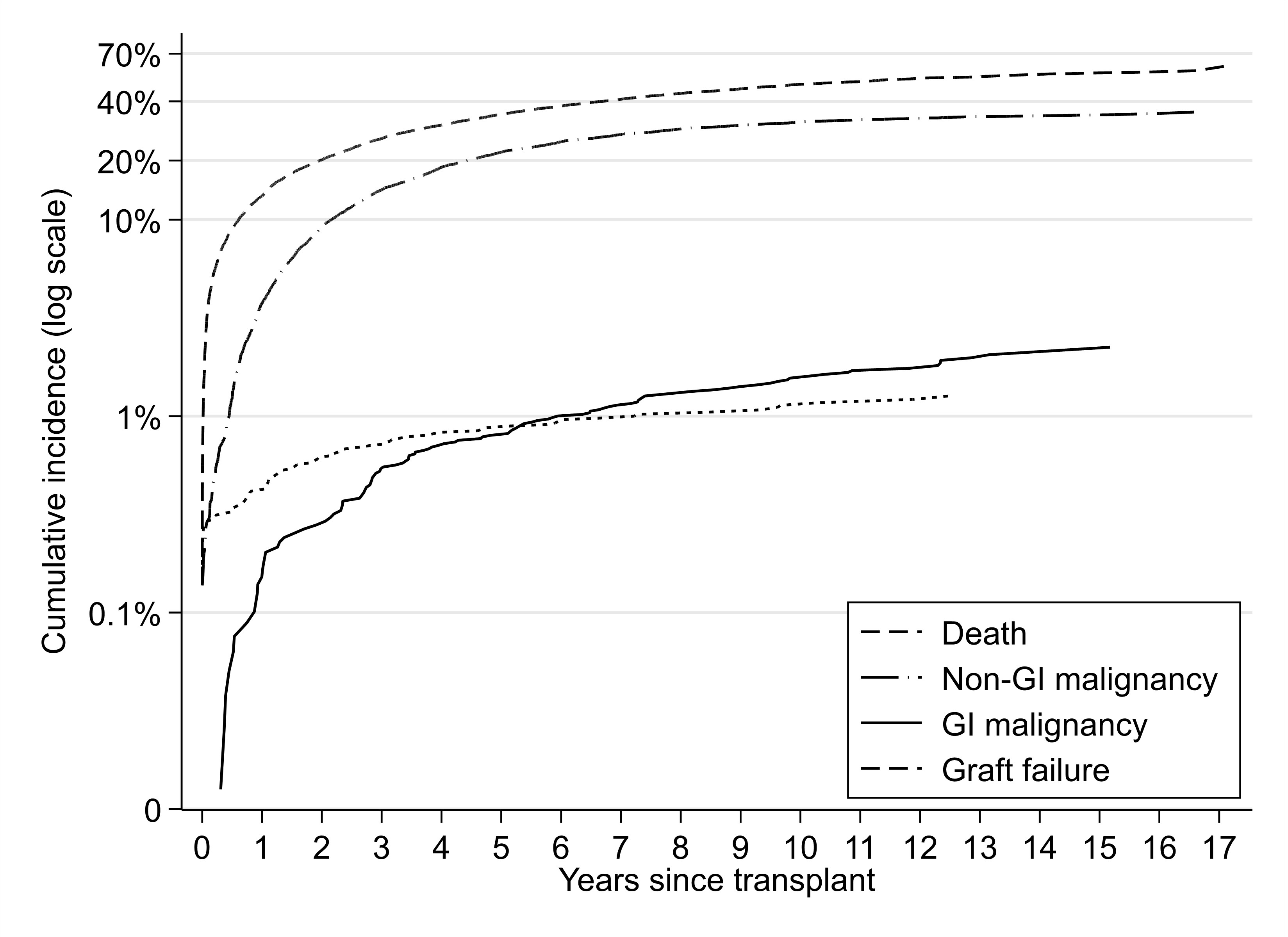Sunday Poster Session
Category: Colon
P0243 - Evaluating Gastrointestinal Cancer Risks in Sarcoidosis Patients Following Lung Transplantation
Sunday, October 27, 2024
3:30 PM - 7:00 PM ET
Location: Exhibit Hall E

Has Audio

Saeed Graham, MD
East Carolina University
Greenville, NC
Presenting Author(s)
Saeed Graham, MD, Tierra Sanders, DO, Abdulazeez Swaiti, MD, Dmitry Tumin, PhD, Stanley Oghoghorie, MD, Stephanie Ibarra, MD, Christin Wilkinson, MD, Ogugua Obi, MD, MPH, MSc, FCCP
East Carolina University, Greenville, NC
Introduction: Lung transplantation is a critical intervention for patients with end stage sarcoidosis refractory to more conservative interventions for advanced lung disease. There is risk of malignancy inherent to organ transplantation, and studies suggest an increased risk of gastrointestinal cancer in those with sarcoidosis. Hypothesizing an additive or synergistic relationship between these two risks, we sought to investigate the risk of gastrointestinal de-novo malignancy in lung transplant patients with sarcoidosis.
Methods: Adult patients aged 18 years or older, who underwent lung transplantation between May 4, 2005 and December 31, 2018 for an indication of sarcoidosis or idiopathic pulmonary fibrosis; the most common lung transplant indication, were identified using the United Network for Organ Sharing registry. Patients were tracked until the earliest development of esophageal, stomach, small intestinal, pancreatic, colorectal, primary liver cancer, other cancer, graft failure, death, or censoring. Covariates measured at transplantation included patient age, sex, race/ethnicity, HBV and HCV status, lung allocation score, transplant type, year of transplantation, and maintenance immunosuppression.
Results: Of 7,996 eligible patients, 108 (1.35%) developed gastrointestinal malignancies post lung transplant. Competing risk events included death (43%), non-gastrointestinal malignancy (27%), and graft failure (1%). Sarcoidosis patients, compared to IPF patients, exhibited a non-significant increased sub-hazard ratio of 1.72 for GI malignancy (p=0.099, CI [0.90,3.29]). Key findings indicate that while lung transplant and sarcoidosis independently increase cancer risk, their combination does not significantly elevate GI cancer risk beyond that observed in IPF patients alone.
Discussion: Sarcoidosis as an indication for lung transplant does not confer additional risk for gastrointestinal malignancy above that seen with idiopathic pulmonary fibrosis. Given the procedural risks associated with gastrointestinal cancer screening and its relatively low incidence among sarcoid lung transplant recipients, our results do not suggest the need for further screening in this patient group beyond existing population-level guidelines. Prioritizing surveillance for more prevalent malignancies may optimize resource utilization within expected life spans among lung transplant recipients.

Note: The table for this abstract can be viewed in the ePoster Gallery section of the ACG 2024 ePoster Site or in The American Journal of Gastroenterology's abstract supplement issue, both of which will be available starting October 27, 2024.
Disclosures:
Saeed Graham, MD, Tierra Sanders, DO, Abdulazeez Swaiti, MD, Dmitry Tumin, PhD, Stanley Oghoghorie, MD, Stephanie Ibarra, MD, Christin Wilkinson, MD, Ogugua Obi, MD, MPH, MSc, FCCP. P0243 - Evaluating Gastrointestinal Cancer Risks in Sarcoidosis Patients Following Lung Transplantation, ACG 2024 Annual Scientific Meeting Abstracts. Philadelphia, PA: American College of Gastroenterology.
East Carolina University, Greenville, NC
Introduction: Lung transplantation is a critical intervention for patients with end stage sarcoidosis refractory to more conservative interventions for advanced lung disease. There is risk of malignancy inherent to organ transplantation, and studies suggest an increased risk of gastrointestinal cancer in those with sarcoidosis. Hypothesizing an additive or synergistic relationship between these two risks, we sought to investigate the risk of gastrointestinal de-novo malignancy in lung transplant patients with sarcoidosis.
Methods: Adult patients aged 18 years or older, who underwent lung transplantation between May 4, 2005 and December 31, 2018 for an indication of sarcoidosis or idiopathic pulmonary fibrosis; the most common lung transplant indication, were identified using the United Network for Organ Sharing registry. Patients were tracked until the earliest development of esophageal, stomach, small intestinal, pancreatic, colorectal, primary liver cancer, other cancer, graft failure, death, or censoring. Covariates measured at transplantation included patient age, sex, race/ethnicity, HBV and HCV status, lung allocation score, transplant type, year of transplantation, and maintenance immunosuppression.
Results: Of 7,996 eligible patients, 108 (1.35%) developed gastrointestinal malignancies post lung transplant. Competing risk events included death (43%), non-gastrointestinal malignancy (27%), and graft failure (1%). Sarcoidosis patients, compared to IPF patients, exhibited a non-significant increased sub-hazard ratio of 1.72 for GI malignancy (p=0.099, CI [0.90,3.29]). Key findings indicate that while lung transplant and sarcoidosis independently increase cancer risk, their combination does not significantly elevate GI cancer risk beyond that observed in IPF patients alone.
Discussion: Sarcoidosis as an indication for lung transplant does not confer additional risk for gastrointestinal malignancy above that seen with idiopathic pulmonary fibrosis. Given the procedural risks associated with gastrointestinal cancer screening and its relatively low incidence among sarcoid lung transplant recipients, our results do not suggest the need for further screening in this patient group beyond existing population-level guidelines. Prioritizing surveillance for more prevalent malignancies may optimize resource utilization within expected life spans among lung transplant recipients.

Figure: Cumulative incidence plot of gastrointestinal (GI) de-novo malignancy and competing risk events after lung transplantation for sarcoidosis or idiopathic pulmonary fibrosis.
Note: The table for this abstract can be viewed in the ePoster Gallery section of the ACG 2024 ePoster Site or in The American Journal of Gastroenterology's abstract supplement issue, both of which will be available starting October 27, 2024.
Disclosures:
Saeed Graham indicated no relevant financial relationships.
Tierra Sanders indicated no relevant financial relationships.
Abdulazeez Swaiti indicated no relevant financial relationships.
Dmitry Tumin: Kate B. Reynolds Charitable Trust – Grant/Research Support. Lilly and Co Inc. – Grant/Research Support.
Stanley Oghoghorie indicated no relevant financial relationships.
Stephanie Ibarra indicated no relevant financial relationships.
Christin Wilkinson indicated no relevant financial relationships.
Ogugua Obi indicated no relevant financial relationships.
Saeed Graham, MD, Tierra Sanders, DO, Abdulazeez Swaiti, MD, Dmitry Tumin, PhD, Stanley Oghoghorie, MD, Stephanie Ibarra, MD, Christin Wilkinson, MD, Ogugua Obi, MD, MPH, MSc, FCCP. P0243 - Evaluating Gastrointestinal Cancer Risks in Sarcoidosis Patients Following Lung Transplantation, ACG 2024 Annual Scientific Meeting Abstracts. Philadelphia, PA: American College of Gastroenterology.
